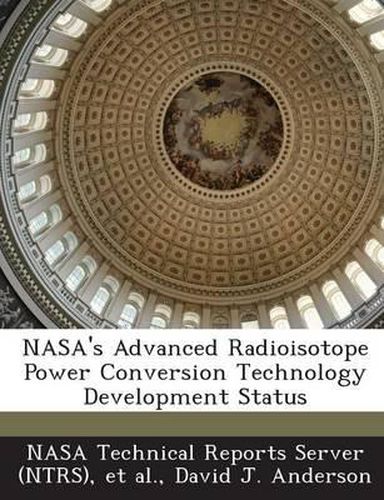Readings Newsletter
Become a Readings Member to make your shopping experience even easier.
Sign in or sign up for free!
You’re not far away from qualifying for FREE standard shipping within Australia
You’ve qualified for FREE standard shipping within Australia
The cart is loading…






NASA’s Advanced Radioisotope Power Systems (ARPS) project is developing the next generation of radioisotope power conversion technologies that will enable future missions that have requirements that cannot be met by either photovoltaic systems or by current radioisotope power systems (RPSs). Requirements of advanced RPSs include high efficiency and high specific power (watts/kilogram) in order to meet future mission requirements with less radioisotope fuel and lower mass so that these systems can meet requirements for a variety of future space applications, including continual operation surface missions, outer-planetary missions, and solar probe. These advances would enable a factor of 2 to 4 decrease in the amount of fuel required to generate electrical power. Advanced RPS development goals also include long-life, reliability, and scalability. This paper provides an update on the contractual efforts under the Radioisotope Power Conversion Technology (RPCT) NASA Research Announcement (NRA) for research and development of Stirling, thermoelectric, and thermophotovoltaic power conversion technologies. The paper summarizes the current RPCT NRA efforts with a brief description of the effort, a status and/or summary of the contractor’s key accomplishments, a discussion of upcoming plans, and a discussion of relevant system-level benefits and implications. The paper also provides a general discussion of the benefits from the development of these advanced power conversion technologies and the eventual payoffs to future missions.
$9.00 standard shipping within Australia
FREE standard shipping within Australia for orders over $100.00
Express & International shipping calculated at checkout
NASA’s Advanced Radioisotope Power Systems (ARPS) project is developing the next generation of radioisotope power conversion technologies that will enable future missions that have requirements that cannot be met by either photovoltaic systems or by current radioisotope power systems (RPSs). Requirements of advanced RPSs include high efficiency and high specific power (watts/kilogram) in order to meet future mission requirements with less radioisotope fuel and lower mass so that these systems can meet requirements for a variety of future space applications, including continual operation surface missions, outer-planetary missions, and solar probe. These advances would enable a factor of 2 to 4 decrease in the amount of fuel required to generate electrical power. Advanced RPS development goals also include long-life, reliability, and scalability. This paper provides an update on the contractual efforts under the Radioisotope Power Conversion Technology (RPCT) NASA Research Announcement (NRA) for research and development of Stirling, thermoelectric, and thermophotovoltaic power conversion technologies. The paper summarizes the current RPCT NRA efforts with a brief description of the effort, a status and/or summary of the contractor’s key accomplishments, a discussion of upcoming plans, and a discussion of relevant system-level benefits and implications. The paper also provides a general discussion of the benefits from the development of these advanced power conversion technologies and the eventual payoffs to future missions.